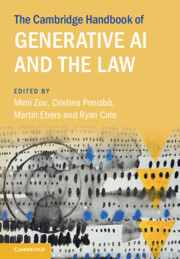Book contents
- Frontmatter
- Contents
- Figures
- Tables
- Contributors
- Foreword
- Preface
- Part I Understanding Generative AI from Multidisciplinary Perspectives
- Part II Evolving Regulatory and Governance Frameworks
- 6 LLMs Meet the AI Act
- 7 Mapping Generative AI Liability Cases in the EU Legal Framework
- 8 Challenges for Foundation Model Liability and Regulatory Regimes
- 9 Navigating China’s Regulatory Approach to Generative AI
- 10 Singapore’s Evolving AI Governance Framework
- 11 Shaping Global AI Governance
- 12 Generative AI and International Standardisation
- 13 Private Ordering and Generative AI
- Part III Generative AI
- Part IV The Use of Generative AI in Legal and Related Sectors
7 - Mapping Generative AI Liability Cases in the EU Legal Framework
from Part II - Evolving Regulatory and Governance Frameworks
Published online by Cambridge University Press: 08 August 2025
- Frontmatter
- Contents
- Figures
- Tables
- Contributors
- Foreword
- Preface
- Part I Understanding Generative AI from Multidisciplinary Perspectives
- Part II Evolving Regulatory and Governance Frameworks
- 6 LLMs Meet the AI Act
- 7 Mapping Generative AI Liability Cases in the EU Legal Framework
- 8 Challenges for Foundation Model Liability and Regulatory Regimes
- 9 Navigating China’s Regulatory Approach to Generative AI
- 10 Singapore’s Evolving AI Governance Framework
- 11 Shaping Global AI Governance
- 12 Generative AI and International Standardisation
- 13 Private Ordering and Generative AI
- Part III Generative AI
- Part IV The Use of Generative AI in Legal and Related Sectors
Summary
The advent and momentum gained by Generative AI erupted into the EU regulatory scene signalling a significant paradigm shift in the AI landscape. The AI Act has struggled to embrace the eruption and extraordinary popularity of Generative AI and managed to provide for specific solutions designed for these models. Nonetheless, there are legal and regulatory implications of Generative AI that may exceed the proposed solutions. Understanding the paradigm shift that Generative AI is likely to bring will allow us to assess the sufficiency and adequacy of the measures adopted and to identify possible shortcomings and gaps in the current EU framework. Generative AI raises specific problems in the compliance of AI Act obligations and in the application of liability rules that have to be acknowledged and properly addressed. Multimodality, emergence factor, scalability or generality of tasks may mismatch the assumption underlying the obligations and requirements laid down for AI systems. The chapter explores whether the current ecosystem of existing and still-to-be adopted rules on AI systems does fully and adequately address the distinctive features of Generative AI, with special consideration to the interaction between the AI Act and the liability rules as provided for the draft AILD and the revPLD.
Keywords
Information
- Type
- Chapter
- Information
- The Cambridge Handbook of Generative AI and the Law , pp. 99 - 121Publisher: Cambridge University PressPrint publication year: 2025
